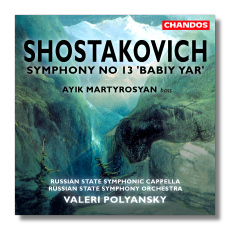
The Internet's Premier Classical Music Source
Related Links
- Shostakovich Reviews
- Latest Reviews
- More Reviews
-
By Composer
-
Collections
DVD & Blu-ray
Books
Concert Reviews
Articles/Interviews
Software
Audio
Search Amazon
Recommended Links
Site News
 CD Review
CD Review
Dmitri Shostakovich

Symphony #13 "Babiy Yar"
Ayik Martyrosyan, bass
Russian State Symphony Orchestra & Symphonic Cappella/Valeri Polyansky
Chandos CHAN9690 DDD 62:05
Any Russian performance of this symphony is potentially of interest because, after all, the musicians should be able to relate to Evtushenko's text, and to Shostakovich's Mussorgskian setting of them. This is the fifth release in what looks like a Shostakovich symphony series by Polyansky and Friends. Although it doesn't always succeed, this version of Shostakovich's dark masterpiece is worth hearing for its several unusual features. At least it doesn't sound exactly like everyone else's "Babiy Yar."
Armenian-born bass Ayik Martyrosyan is in his mid-20s. He is right in line with the recent trend in recordings of this symphony: a baritonal bass. Presumably listeners can relate more to this sound than to the sepulchral one made by Vitaly Gromadsky, who sang in the work's 1962 première. In its higher registers, Martyrosyan's voice develops a particularly noticeable vibrato. This didn't disturb me at all, but some listeners will see it as another weakness. On the plus side, Martyrosyan singing is always intelligent and often beautiful, and when he sings tenderly, even icy hearts might melt. The Russian State Symphonic Cappella also misses, perhaps intentionally, the dark colors that used to be the norm for this symphony (even in America - try Ormandy's excellent recording, a strong candidate, I feel, for RCA Victor's new High Performance series). Rough in the first two movements, they achieve greater solidity in the last three. In any event, those who take it for granted that Russian choral ensembles will knock their socks off may be disappointed by the choral work here. Again, though, the relative shortcomings in mass and darkness are compensated for by sensitivity.
This recording's strengths can be felt in the non-vocal department. Polyansky makes a number of interesting basic tempo choices, and is liberal with tempo changes within a movement. The first two movements are a little faster than normal (the opening "Babiy Yar" is more cinematic as a result), and the final three turn out to be a little slower; they form an unbroken chain that is almost 38 minutes long. Then there are matters of orchestral balance and voicing. The opening chords of "Humor" sound incredibly nasty; I suspect that Polyansky also directed the musicians to play slightly out of tune here. Overall, while the Orchestra's playing is not all that remarkable, Polyansky scores points by maintaining clarity, and by shaping the work from its first note to its last. Indeed, I've been listening to this symphony for more than twenty years, and last night was the first time it really registered that the symphony ends as it opens - with the tolling of a bell - and that this establishes its kinship with another work that Shostakovich is said to have admired greatly: Britten's War Requiem.
The recording favors the percussion instruments; each time a drum is hit, it's like sitting next to a guillotine. I was interested to note that the producer/engineer was Igor Veprintsev, whose name appeared on many Melodiya recordings decades ago. How much better the sound is now! Chandos' booklet contains texts (in Cyrillic - authentic, but not overly helpful for those who can't read this alphabet), and translations in three languages.
Copyright © 1999, Raymond Tuttle


















